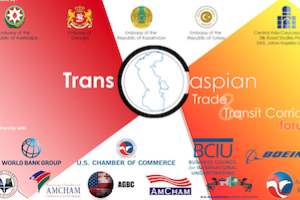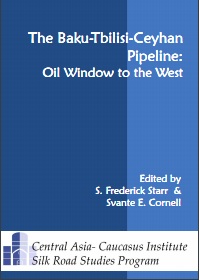Azerbaijan Since Independence
Book, Routledge, 2011
Svante E. Cornell, Azerbaijan Since Independence
Azerbaijan Since Independence offers a comprehensive intro- duction to modern Azerbaijan, a post-Soviet republic located on the western shore of the Caspian Sea. This small country has outsized importance due to its strategic location at the cross- roads of Europe and Asia, its energy wealth, and its historical experience as an early modernizer in the Muslim world.
The book begins with six chapters on Azerbaijan’s history from pre-Soviet times to the present, with an emphasis on the past twenty years. The next four chapters are thematic, covering the con ict over Karabakh, the political system, the oil-dominated economy, and societal changes and trends including the role of Islam. The remainder of the book surveys Azerbaijan’s foreign relations, with an analysis of the foreign- policy-making context complemented by chapters on relations with Iran, Russia, Turkey, and the West. The book closes with a brief epilogue discussing the country’s future.
Svante E. Cornell is Director of the Central Asia-Caucasus Institute & Silk Road Studies Program, a Joint Center affiliated with the Johns Hopkins University’s School of Advanced International Studies and the Stockholm-based Institute for Security and Development Policy (ISDP).
See details and order the book from Routledge or on Amazon.com
Contents:
TRANSIT FORUM: Trans-Caspian East-West Trade and Transit Corridor
TRANSIT FORUM with the Embassies of Azerbaijan, Georgia, Kazakhstan, and Turkey
Thursday, 28 April, 2016, from 8 a.m. to 4 p.m.
The Central Asia, Caspian, South Caucasus and Black Sea regions together form a strategically important transit corridor between China and Europe. Connecting trade, people and economies, the modern trans-Caspian trade and transit routes from China to Europe, envisages an extensive and integrated network of infrastructure, special economic zones, harmonized customs, and cross-border procedures along this route.
Azerbaijan, Georgia, Kazakhstan and Turkey combined represent a market of more than 110 million consumers. These countries are able to offer customized and integrated solutions to companies with highly sophisticated supply chains.
Video of the forum can now be viewed on the SAIS Events YouTube channel.
On Thursday, April 28, 2016, the Embassies of Azerbaijan, Georgia, Kazakhstan, and Turkey to the U.S.A., are organizing the “Trans-Caspian East-West Trade and Transit Corridor” Forum in Washington, D.C., in partnership with the World Bank Group, U.S. Chamber of Commerce, Business Council for International Understanding, Boeing Company, U.S.-Azerbaijan Chamber of Commerce, AmCham Azerbaijan, America-Georgia Business Council, U.S.-Kazakhstan Business Association, AmCham Kazakhstan, AmCham Georgia, and Turkish-American Business Association/AmCham Turkey.
This special all-day forum, hosted by the Central Asia and Caucasus Institute at SAIS-Johns Hopkins University, will introduce projects and investments along the modern Silk Road to U.S. business leaders across a variety of multinational industries.
Speakers at this special forum include: Ambassador Elin Suleymanov, Azerbaijan; Ambassador Archil Gegeshidze, Georgia; Ambassador Kairat Umarov, Kazakhstan; Ambassador Serdar Kılıç, Turkey; Mr. Gary Litman, VP, US Chamber of Commerce; S. Frederick Starr, Chairman, Central Asia-Caucasus Institute, JHU-SAIS; Dr. Taleh Ziyadov, Director-General, Baku International Sea and Trade Port; Mr. Rauf Valiyev, Chairman, Azerbaijan Caspian Shipping; Mr. Mamuka Bakhtadze, CEO, Georgian Railways; Ms. Ketevan Salukvadze, Head of Transport Policy Dept., Ministry of Economy and Sustainable Development; Mr. Askar Mamin, President, Kazakhstan Railways; Mr. Sanzhar Yelubayev, President of KTZ Express; Mr. Osman Nuri Beyhan, Deputy Director General for EU and International Affairs, Ministry of Customs and Trade; and others TBA.
Schedule, Thursday, 28 April 2016:
8:00 - 9:00 a.m. Continental breakfast
9:00 - 10:00 a.m. Welcome by the Central Asia-Caucasus Institute, the US
Dept of State, Ambassadors of Azerbaijan, Georgia,
Kazakhstan, and Turkey, and representatives from the US
Chamber of Commerce
10:00 - 11:00 a.m. Panel #1: "Trans-South Caucasus Customs and Trade
Facilitation: What Needs to Be Done?"
Moderator: S. Frederick Starr
11:00 - 11:25 a.m. Q & A
11:25 - 11:40 a.m. Break (refreshments)
11:40 - 12:40 p.m. Panel #2: "'From Sea to Sea' Integrated Regional Transit
and Logistics Infrastructure."
Moderator: TBD
12:40 - 1:00 p.m. Q & A
1:00 - 2:00 p.m. Lunch served in the auditorium
2:00 - 3:00 p.m. Panel #3 "Commercial and Investment Opportunities:
Financing, Logistics, and Supply Chain."
Moderator: Jorg Frieden, Executive Director, The World
Bank Group
3:00 - 3:25 p.m. Q & A
3:25 - 4:00 p.m. Closing remarks
SAIS - Johns Hopkins University
1740 Massachusetts Ave., NW
Washington, DC 20036
Multiculturalism and inter-religious tolerance: the experience of Azerbaijan and its significance for Europe

Multiculturalism and inter-religious tolerance: the experience of Azerbaijan and its significance for Europe
Wednesday, Nov. 18, 2015, from 2 to 4 p.m.
On November 18, 2015, a delegation of religious dignitaries from Azerbaijan will visit Stockholm. The delegation consists of the Muslim mufti, Sheikh-ul-Islam Allahshukur Pashazade, as well as the Russian Orthodox Archbishop, the Catholic Nuncio, and the leaders of the community of Mountain Jews and the Community of European Jews of Azerbaijan, as well as the State Counsellor for multiculturalism and religious affairs. In a time when the greater Middle East suffers from escalating sectarian conflict, the Azerbaijani delegation provides a unique example of ethnic, religious tolerance and mutual understanding -- as recently showcased by Time Magazine.
A seminar will be held in Stockholm's Sheraton Hotel on November 18 between 14.00-18.00, which will provide the opportunity to discuss the Azerbaijani and Swedish experiences of multiculturalism and religious tolerance.
The Institute for Security and Development Policy is a co-organizer of this seminar in cooperation with the Embassy of Azerbaijan to the Kingdom of Sweden, and the Baku International Multiculturalism Center.
Conference program:
- 14:00 – 14:30 Welcome speeches
Kamal Abdullayev: Member of the Azerbaijan National Academy of Sciences
State Adviser on Inter-ethnic, Multicultural and Religious Affairs of the Republic of Azerbaijan (click for video)
Sheikh ul-Islam Allahshukur Pashazada
Chairman of the Caucasian Muslim Board
Dr. Adish Mammadov
Ambassador of the Republic of Azerbaijan to the Kingdom of Sweden (click for video)
Dr. Svante Cornell
Director of the Institute of Security and Development Policy (click for video)
- 14:30 – 16:00 Panel I
"Azerbaijan's experience of inter-religious tolerance"
Moderator:
Azad Mammadov
Executive director of Baku International Multiculturalism Center
Lectures:
Kamal Abdullayev: Member of the Azerbaijan National Academy of Sciences
State Adviser on Inter-ethnic, Multicultural and Religious Affairs of the Republic of Azerbaijan
Sheikh ul-Islam Allahshukur Pashazada
Chairman of the Caucasian Muslim Board
Alexander Ishein
Archbishop of the Baku and Azerbaijan eparchy of the Russian Orthodox Church
Ordinary Vladimir Fekete
Ordinary of the Apostolic Prefecture of the Roman Catholic Church in Azerbaijan
Milix Yevdayev
Leader of the Mountain Jews Religious Community
Gennadiy Zelmanovich
Chairman of the Baku Religious Community of European Jews
16:00 – 16:30 Break
- 16:30 – 18:00 Panel II
"Azerbaijani and Swedish models of multiculturalism: comparative analysis"
Moderator:
Dr. Svante Cornell
Director of the Institute of Security and Development Policy
Lectures:
Helene Egnell
The Centre for Inter Faith Dialogue
Göran Lennmarker
Former member of Swedish parliament, former president of the OSCE Parliamentary Assembly
Azad Mammadov
Executive director of Baku International Multiculturalism Center
Dr. Svante Cornell
Director of the Institute of Security and Development Policy
Stefan Gullgren
Deputy Director-General of the Swedish MFA, Head of Department for Eastern Europe and Central Asia
The working languages of the conference will be Azerbaijani and English.
The complete program is available here.
Location:
Sheraton Stockholm Hotel
Tegelbacken 6
10123 Stockholm, Sweden
Finally, a Caspian Opening to the East: Baku's New Port to India and China

Finally, a Caspian Opening to the East: Baku's New Port to India and China
Wednesday, Dec. 9, 2015, from 5 to 7 p.m.
(reception at 5 p.m. with Georgian wine, followed by the main program at 5:30)
SPEAKERS:
CEO, Baku International Sea Trade Port CJSC
Brenda Shaffer
Visiting Professor, Georgetown University
Kaush Arha
Vice Chairman ICCF Group
Former Senior Advisor Transition - US Embassy Kabul
MODERATOR: S. Frederick Starr, Chairman, Central Asia-Caucasus Institute
Rome Building Auditorium
SAIS - Johns Hopkins University
1619 Massachusetts Ave., NW
Washington, DC 20036
Click here to RSVP and register
The Baku-Tbilisi-Ceyhan Pipeline: Oil Window to the West
By S. Frederick Starr & Svante E. Cornell (Eds.)
Click to Download full book as PDF file or click on individual chapters below.
1. The Baku-Tbilisi-Ceyhan Pipeline: School of Modernity 7
S. Frederick Starr
2. Geostrategic Implications of the Baku-Tbilisi-Ceyhan Pipeline 17
Svante E. Cornell, Mamuka Tsereteli and Vladimir Socor
3. Economic Implications of the Baku-Tbilisi-Ceyhan Pipeline 39
Jonathan Elkind
4. The Baku-Tbilisi-Ceyhan Pipeline: Implications for Azerbaijan 61
Svante E. Cornell and Fariz Ismailzade
5. The Baku-Tbilisi-Ceyhan Pipeline: Implications for Georgia 85
Vladimer Papava
6. The Baku-Tbilisi-Ceyhan Pipeline: Implications for Turkey 103
Zeyno Baran
7. Environmental and Social Aspects of the Baku-Tbilisi-Ceyhan Pipeline 119
David Blatchford




